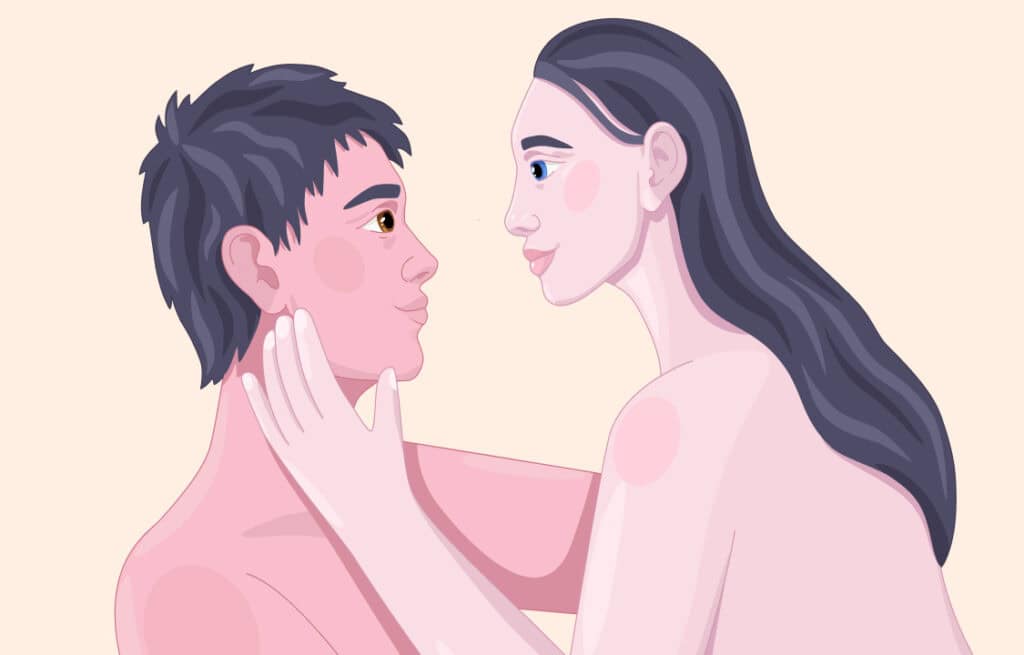Health
5 Benefits of Yoga for Mental Health in 2024

Have you ever tried yoga? If not, you might be missing out on some amazing benefits for your mental health. Yoga is a popular form of exercise that has been shown to have numerous benefits for mental health. In this article, we’ll explore 5 ways that yoga can improve your mental health.
1. Reduces stress and anxiety
One of the most well-known benefits of yoga is its ability to reduce stress and anxiety. Yoga involves deep breathing and relaxation techniques that can help calm your mind and reduce feelings of stress and anxiety.
2. Improves mood and emotional regulation
Yoga has also been shown to improve mood and emotional regulation. Regular yoga practice can help you feel more positive and optimistic, and can even help reduce symptoms of depression.
3. Enhances mindfulness and self-awareness
Another benefit of yoga is that it can enhance mindfulness and self-awareness. Yoga involves focusing on your breath and body, which can help you become more present and aware of your thoughts and emotions.
4. Boosts self-esteem and confidence
Yoga can also boost self-esteem and confidence. As you become more comfortable with the practice, you may feel more confident in your abilities and more comfortable in your own skin.
5. Improves sleep quality
Finally, yoga has been shown to improve sleep quality. Regular yoga practice can help you fall asleep faster and stay asleep longer, leading to better overall health and well-being.
Incorporating yoga into your daily routine can have a positive impact on your mental health and overall well-being. Whether you’re a beginner or an experienced yogi, there are many different types of yoga to choose from, so you’re sure to find a practice that works for you. So why not give it a try and see how it can benefit your mental health.
You may like
-
Mbah recruits 2,200 healthcare workers in Enugu
-
Rivers partner with Canada to boost healthcare delivery
-
Can Dementia be Prevented? Here is What New Study Reveals
-
Why men should have sex at least 21 times a month – Doctor
-
Is Your Memory Getting Worse? 8 Reasons That Can Happen, According to Doctors
-
“Minister Exposes Deep-Seated Corruption in Nigeria’s Health Sector: Urgent Reform Needed
-
5 Easy Steps You Should Know If You Want To Lose Weight in 30 Days
-
How To Boost Your Energy to Levels With Healthy Diets
-
How To Improve Your Mental Health To Be Happier
-
Lagos alerts residents to outbreak of severe gastroenteritis caused by Cholera
-
Five Ways To Develop Unshakeable Self-Discipline
-
NCDC Issues Urgent Warning Amidst Escalating Cholera Outbreak
Health
Cancer Diagnosis: Death sentence or new perspective to life?

At 25 years and newly married, Mrs Elizabeth Awo-Ejeh was full of life and had her dreams of building a family while pursuing the career ahead of her.
However, in 2021, she discovered a lump in one of her breasts. To her, it was not anything to bother about since it did not hurt her, and neither was there any discharge from it.
During a visit to the hospital, the doctor even reassured her that the lump was nothing to worry about.
“However, deep down, I felt something was not right. Thankfully, my husband encouraged me to seek a second opinion.
“At the next hospital, the doctor recommended a breast ultrasound because I was only 24 at the time. The results showed that the lump was a Fibro Adenoma, a non-cancerous tumour.
“The doctor advised me to either remove it or wait six months to see if it would go away on its own and I chose to wait, but after six months, I began to feel sharp pain and noticed some discharge.
“I immediately knew something was wrong and went back to the hospital for another ultrasound. This time, the results showed the lump was suspicious for cancer,’’ she said.
According to her, after a biopsy, she was diagnosed with invasive ductal carcinoma, Estrogen Receptors and Progesterone Receptors-positive.
“At just 25, newly married and with dreams of starting a family and building my career, I felt my world fall apart,” she narrated.
Like many, Awo-Ejeh believed cancer diagnosis to be a death sentence. But her perception has changed since medical experts convinced her that it can be treated.
According to her, she was referred to a hospital for treatment, where she underwent eight sessions of chemotherapy, a mastectomy to remove the affected breast and 25 sessions of radiation.
“With God’s help, I am now in remission. Since the cancer is hormone receptor-positive, I have been on hormone therapy for five years, taking medication daily to prevent a recurrence.
“Cancer is highly treatable, especially when detected early, which is why I am sharing my story,” she said.
For Mrs Mariam Salami, before her diagnosis, she lived an unhealthy lifestyle, often prioritising convenience and comfort over well-being.
She said her diet was filled with processed foods, high in sugar and unhealthy fats, with minimal intake of healthy diet.
However, getting diagnosed with cancer was something she was completely unprepared for.
“The news hit me like a wave, leaving me feeling heartbroken, shocked, and overwhelmed. I was consumed by sadness and a deep sense of fear.
“Questions flooded my mind as I tried to make sense of it all, wondering how this could have happened and what I could have done differently.
“It felt like my world had been turned upside down in an instant, and I was left grappling with uncertainty, struggling to find the strength to face what lay ahead,” she said.
Salami said that her experience during treatment was filled with immense pain and anguish, with every step testing her strength in ways she never imagined, leaving her physically and emotionally drained.
However, through it all, the support she received from her spouse, family, friends and colleagues strengthened her throughout the treatment.
The World Health Organisation (WHO) describes cancer as a large group of diseases that can start in almost any organ or tissue of the body.
It happens when abnormal cells grow uncontrollably beyond their usual boundaries to invade adjoining parts of the body and/or spread to other organs.
WHO also said cancer was the second leading cause of death globally, accounting for an estimated 9.6 million deaths, or one in six deaths, as at 2018.
According to data from the Global Cancer Observatory (GLOBOCAN), Nigeria recorded 127,763 new cancer cases in 2022.
The consequence is 79,542 deaths from breast cancer, prostate and cervix uterias the top leading cancers in the country.
The Federal Ministry of Health and Social Welfare says there was no actual data on the number of cancer survivors in the country as the nation just recently began to collect data on cancer survivors.
According to Dr Uchechukwu Nwokwu, the National Coordinator, National Cancer Control Programme the ministry before now, the data collected from hospitals on survivors and have not been captured in the Cancer Registry (CANREG) software.
He said what was captured were diagnosis, age and the type of cancer, but that in the current strategic plan, survivorship now stands as an area of interest.
However, based on the programmes implemented by the Federal Government through the ministry, such as the Cancer Access Partnership Programme (CAPP) and the Cancer Health Fund (CHF), data on those who have accessed the programme exists.
“Those we refer to as “survivors” in cancer management are those who have lived with the disease or have managed it and survived for five years. We consider them as having survived the disease.
“This is because most cancers are not curable. About 40 per cent are actually curable, but majority, about 46 per cent are not curable.”
According to Nwokwu, about 6,000 cancer patients have accessed CAPP.
“For those who have commenced therapy after diagnosis, we can confidently say based on our experience that 50 per cent of them survive the disease.”
He, however, said that the major challenge that has affected survivorship of the disease was late diagnosis and commencement of treatment.
Speaking no why the disease does not pose a death threat as it did before, Dr Hannatu Ayuba, said this was because there were now advancements in the management of cancer in all the different modalities of treatment.
Ayuba is a Radiation and Clinical Oncologist at the National Hospital, Abuja.
She cited with early detection as one of the factors, adding that there were also improved screening methods and more sensitive biomarkers that make it easy to detect the disease before it manifests.
She also said there are more improved surgical techniques such as minimally invasive surgeries and robotic surgeries which are highly precise.
“There have also been advancements in radiation therapy by the use of highly targeted treatments, intensely modulated radiation treatment, stereotactic body radiation and stereotactic radio surgery.
“All these have benefits just like surgery when it’s done in very sensitive areas, protecting nearby critical structures.
“Also, there are more sensitive, more advanced therapies in radiation treatment like the proton therapy, and intensity modulated proton therapy and in the chemotherapy modality, there are more tailored regimens from clinical trials,” she said.
These, according to her, have brought out different and more effective patterns of targeted treatments that improve efficacy with reduced toxicity profiles.
Ayuba said in immunotherapy, there were special medications used to help improve the immune system to fight cancer cells.
She said in precision medicine, there was genetic profiling, molecular diagnostics, which guide and personalise treatment decisions for different diseases, giving some form of customised treatment for patients.
“There are more advanced, more effective medications for hormone therapy for certain tumors that are hormone sensitive like breast and prostate.
“We also have stem cell transplants. These are procedures that help to rebuild the immune system after high dose chemotherapy has been given for certain cancers that need such treatments” she said.
The oncologist said that all these have improved patient outcomes.
She said that presently, the practice in most of the nation’s tertiary hospitals where cancer is managed is the employment of more improved procedures in supportive care.
She said it also included the management of the side effects that patients go through, pain management and mental health in cancer survivors.
Prof. Muhammad Pate, Coordinating Minister of Health and Social Welfare, urged Nigerians to not be afraid about cancer as it was no longer an invitation to death.
This, he said, was because due to genomics, advances in the technology and precision medicine, there was the possibility that an increasing number of cancers will be curable.
He, however, said that it was not over yet, adding that even with technological advancements, cancer now stands as the fastest growing Non-Communicable Disease (NCD) in Nigeria.
Ms Gloria Orji-Nwajiogu, a two-time survivor of breast cancer and an advocate, cancer survivors need a lot of intervention to continue with their lives.
Orji-Nwajiogu, President of the Network of People Impacted by Cancer in Nigeria, said that the issue of stigma that accompanies the disease was worrisome.
“It’s not just about the treatment, we should think about the survivorship.
“Unfortunately that is one area that we have been lacking in Nigeria and that is because even some of the doctors do not believe that there can be cancer survivors in Nigeria so why do you need to make plans for them.
“I would want legislation so that a cancer patient, even after diagnosis, will not be laid off work. Many private-sector employers sack them, though hose in government employment are not usually affected,” she said.
Health
Constant sexual intercourse does not prevent prostate cancer– urologist

Dr Odezi Otobo, a Consultant Urologist says there is no medical or urological evidence that constant sexual intercourse and ejaculation reduce a man’s risk of contracting prostate cancer.
Otobo, who works with the University of Calabar Teaching Hospital (UCTH), said this at a medical outreach for men organised by Asi Ukpo Comprehensive Cancer Centre on Monday in Calabar.
The News Agency of Nigeria (NAN) reports that the outreach which was held at the premises of the Christian Central Chapel International (CCCI), Calabar, is part of programmes to commemorate “Movember.”
Movember, which involves growing of moustaches, is an annual event held in November to raise awareness of men’s health issues such as prostate cancer, testicular cancer and men’s mental health.
The urologist who was reacting to claims on social media that constant sexual activities and having multiple girlfriends could prevent prostate cancer, said the disease was either hereditary, caused by lifestyle or environment.
“Instead of taking unprofessional and unscientific advice from different quarters, it is important to visit a hospital if you notice anything and for those in their forties and fifties, get screened because early detection is key to effective treatment of cancer.
“Prostate cancer is an indolent cancer and can be handled when a man is aware, visit a medical facility and change his lifestyle, not by having multiple ‘side chicks,’ he said.
On his part, Mr Yegwa Ukpo, the Executive Director, Asi Ukpo Comprehensive Cancer Centre, said they had to commemorate Movember because men’s health issues were hardly addressed in the society.
Represented by Mrs Mercy Njoku, Event and Outreach Manager of the centre, Ukpo said there was something about masculinity in the society that made men thought they had to keep their issues to themselves.
“I want to appeal to the men to take their health seriously because cases of men slumping and dying in their forties and fifties are on the increase, we don’t want this to continue.
“Also, a lot of men engage in excessive intake of alcohol, others work all the time just to make ends meet without checking their livers, kidneys, hearts and even mental state, this is why we are insisting on this outreach which will be annually,” he said.
Similarly, Dr Saviour Eze, Head of Medical Team in CCCI said that they decided to partner with ASI Ukpo because the outreach specifically called out men to be attended to which was quite unusual in the society.
Eze said as a church, they recognised the fact that physical illnesses should be handled by those God had placed in the Medical profession to take care, even though they pray for God’s healing.
NAN also reports that the outreach which saw men screened for the function of their hearts, kidneys, livers and Prostate Specific Antigen (PSA) was in partnership with the Nigerian Medical Association (NMA), Rotary Club and,Pink Africa among others.
Weight-Loss
Effective Ways to Achieve Weight Loss

Losing weight can be challenging, but with the right approach, it is achievable. Here are some effective ways to help you reach your weight loss goals:
- Set Realistic Goals: Before starting any weight loss program, it’s essential to set realistic goals. Aim to lose 1-2 pounds per week for a sustainable weight loss.
- Eat a Balanced Diet: Focus on consuming a balanced diet rich in whole foods, fruits, vegetables, lean proteins, and whole grains. Avoid processed and high-calorie foods.
- Hydrate Adequately: Drinking plenty of water is crucial for weight loss. Aim for at least 8 cups (64 ounces) of water per day.
- Incorporate Physical Activity: Regular exercise not only helps with weight loss but also improves overall health. Aim for at least 150 minutes of moderate-intensity exercise or 75 minutes of vigorous-intensity exercise per week.
- Get Enough Sleep: Poor sleep can disrupt hormones that regulate hunger and fullness, leading to weight gain. Aim for 7-9 hours of sleep per night.
- Manage Stress: Chronic stress can lead to emotional eating and weight gain. Engage in stress-reducing activities like meditation, yoga, or deep breathing exercises.
- Monitor Progress: Regularly tracking your weight, measurements, and progress photos can help you stay motivated and on track.
- Seek Support: Having a support system in place can make a significant difference in your weight loss journey. Share your goals with friends and family, and consider joining a weight loss support group.
- Be Mindful of Portion Sizes: Eating large portions can lead to consuming more calories than needed. Use a food scale or measuring cups to gauge your portion sizes.
- Get Professional Help: If you’re struggling to lose weight or need personalized guidance, consider consulting a registered dietitian or a healthcare professional.
Remember, weight loss is not a one-size-fits-all approach. It’s essential to find a method that works for you and your lifestyle. Be patient, stay consistent, and celebrate small victories along the way.
Additional Tips:
- Eat more protein to help with satiety and muscle mass.
- Incorporate high-intensity interval training (HIIT) for efficient calorie burn.
- Get enough probiotics to support gut health and weight loss.
- Avoid fad diets and focus on sustainable lifestyle changes.
By incorporating these effective ways to achieve weight loss, you’ll be on your way to a healthier, happier you.
Health
NAFDAC seals illegal wine factory in Abuja

The National Agency for Food and Drug Administration and Control (NAFDAC) has discovered and sealed an illegal wine production factory operating from a residential building in Lugbe, Abuja.
NAFDAC announced the sealing off of the office on Thursday evening through a post it shared on its official X account.
The agency said the clandestine facility was used to counterfeit various imported wine brands, complete with preprinted date markings ready for market distribution.
“NAFDAC’s enforcement team led by Pharm. Mohammed Shaba gained access to the property through legal means and found already-produced wine products and packaging materials,” the post read.
“The suspect was absent during the raid but NAFDAC has summoned them for further questioning.”
Pharm. Shaba thereafter called on consumers to stay alert and report any suspicious products or activities to their nearest NAFDAC office to help ensure public safety.
Health
Over 24m adults living with diabetes in Africa, says WHO

Over 24 million adults are currently living with the deadly diabetes disease in the African region alone, while 12 million others remain undiagnosed.
World Health Organisation’s (WHO) Regional Director for Africa, Dr. Matshidiso Rebecca Moeti, disclosed this to mark the 2024 World Diabetes Day (WDD).
She warned that the number of people living with diabetes in the region could rise to 54 million by 2045 if urgent interventions are not implemented to address this significant health challenge, the highest projected increase globally.
Moeti described diabetes as a chronic lifelong disease that leads to uncontrolled blood sugar levels when “the body can no longer produce or efficiently use the insulin it produces.”
She said, “In the WHO African Region alone, more than 24 million adults are currently living with diabetes, half of whom remain undiagnosed. Left untreated, diabetes can lead to complications such as heart disease, stroke, nerve damage, kidney failure, lower-limb amputation, and eye disease that can result in blindness.
“Without urgent interventions, predictions are that the number of people living with diabetes in the African Region will rise to 54 million by 2045, the highest projected increase globally.
“This poses a significant dual health and economic burden, including catastrophic spending by individuals to control their disease.”
Moeti lamented that Africa has the lowest investment rate in diabetes care worldwide, at only 1% of the region’s health expenditure.
She added that health systems are traditionally designed to deal with acute infectious diseases, with insufficient attention paid to chronic diseases like diabetes.
She stated that this year’s theme, “Breaking Barriers, Bridging Gaps,” emphasises the need for a collaborative approach to the ‘silent killer,’ a disease exacerbated by multiple drivers including urbanisation, unhealthy diets, and physical inactivity.
Moeti noted that managing diabetes requires sustained efforts to balance physical activity, a healthy diet, and mental well-being. She stressed the need for comprehensive prevention strategies to address risk factors like obesity, poor diet, and physical inactivity, combined with community engagement to ensure support systems and reduced stigma.
She recalled that during the 74th session of the WHO Regional Committee for Africa in August, African Member States endorsed WHO’s Framework for the Implementation of the Global Diabetes Compact (GDC) in Africa.
This initiative focuses specifically on integrating diabetes care into broader health systems in a multi-sectoral approach, providing a roadmap for countries to strengthen diabetes prevention, diagnosis, and care, especially at the primary health care level.
Moeti stressed WHO’s commitment to holistic solutions, including proper nutrition, access to essential medicines, and mental health support.
She appealed to individuals, communities, governments, health workers, policymakers, and civil society organisations to work with the organisation to curb the prevalence of diabetes.
She also advised communities and governments to play their roles by creating supportive environments that promote healthy living, reduce stigma, and provide access to affordable diabetes care and education.
Health
Cost of healthy diet stood at N1,346 in September –NBS

The National Average Cost of a Healthy Diet (CoHD) per adult a day stood at N1,346 in September 2024, the National Bureau of Statistics (NBS) has said.
The NBS revealed this in its CoHD report for September 2024 released on Monday in Abuja.
The bureau said that the CoHD in September increased by 7.3 per cent compared to the N1,255 recorded in August.
The NBS said the CoHD was the least expensive combination of locally available items that met globally consistent food-based dietary guidelines.
It said it was used as a measure of physical and economic access to healthy diets.
“This is a lower bound (or floor) of the cost per adult per day excluding the cost of transportation and meal preparation.”
The bureau said that to compute the CoHD indicator, the following data on Retail Food Prices, Food Composition Data, and Healthy Diet Standards were required.
The NBS also said that in September, the average CoHD was highest in the South-West at N1,598 per adult per day, followed by the South-South at N1,462 per day.
It said the lowest average CoHD was recorded in the North-West at N1,144 per adult per day.
The NBS further said that at the state level Osun, Ogun and Lagos recorded the highest CoHD at N1,661, N1,650, and N1,639, respectively.
The bureau said Katsina recorded the lowest CoHD at N1.043, followed by Jigawa at N1,087, and Kebbi at N1,118.
The NBS said CoHD had steadily increased over the past six months, since April 2024.
“The CoHD in September 2024 is 30 per cent higher than what was recorded in April 2024 at N1,035.
“The food groups that have driven the increases in CoHD are legumes, nuts and seeds, starchy staples, and animal source foods.
“Legumes, Nuts and Seeds recorded the smallest increase in price by 3.8 per cent on a monthly basis.”
The report added that animal-source foods were the most expensive food group recommendation to meet in September accounting for 36 per cent of the total CoHD to provide 13 per cent of the total calories.
It noted that fruits and vegetables were the most expensive food groups in terms of price per calorie.
“They accounted for 11 per cent and 15 per cent, respectively, of the total CoHD while providing only seven per cent and five per cent of total calories in the Healthy Diet Basket.
“Legumes, nuts and seeds were the least-expensive food group on average, at seven per cent of the total cost.’’
The report also said that in recent months, the CoHD had risen faster than general inflation and food inflation.
“However, the CoHD and the food Consumer Price Index (CPI) are not directly comparable.
“The CoHD includes fewer items and is measured in Naira per day, while the food CPI is a weighted index,” NBS said.

2025: How To Plan A Budget For The Upcoming Year

Ruud van Nistelrooy Opens Up on Hurtful Manchester United Exit Before Taking Leicester City Job

Obasanjo would have died under Abacha if not for me -Gowon

Why I don’t trust any public institution in Nigeria – Fisayo Soyombo

Minimum Wage: Cross Rivers Workers to embark on indefinite strike

Bayer Leverkusen Forward Victor Boniface Faces Possible Sanction for Reckless Driving Incident

Radda approves N70,000 minimum wage for Katsina workers

PH refinery has not commenced bulk sales – NNPC

CBN issues Dec. 1, ultimatum against banks, ATM delays
























